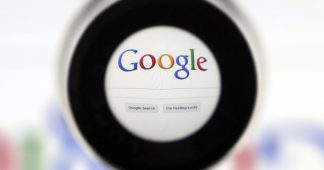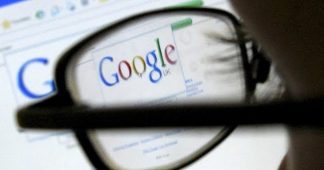By Kevin Kelly, “The Inevitable”
Jun 28, 2016
photo: Courtesy 20th Century Fox/Dreamworks
The design of the internet of everything, and the nature of the cloud that it floats in, is to track data. The 34 billion internet-enabled devices we expect to add to the cloud in the next five years are built to stream data. And the cloud is built to keep the data. Anything touching this cloud that is able to be tracked will be tracked.
Recently, with the help of researcher Camille Hartsell, I rounded up all the devices and systems in the U.S. that routinely track us. The key word is “routinely.” I am leaving off this list the nonroutine tracking performed illegally by hackers, criminals, and cyberarmies. I also skip over the capabilities of the governmental agencies to track specific targets when and how they want to. (Governments’ ability to track is proportional to their budgets.)
This list, instead, tallies the kind of tracking an average person might encounter on an ordinary day in the United States. Each example has been sourced officially or from a major publication.
- Car movements — Every car since 2006 contains a chip that records your speed, braking, turns, mileage, accidents whenever you start your car.
- Highway traffic — Cameras on poles and sensors buried in highway record the location of cars by license plates and fast-track badges. Seventy million plates are recorded each month.
- Ride-share taxis — Uber, Lyft, and other decentralized rides record your trips.
- Long-distance travel — Your travel itinerary for air flights and trains is recorded.
- Drone surveillance — Along U.S. borders, Predator drones monitor and record outdoor activities.
- Postal mail — The exterior of every piece of paper mail you send or receive is scanned and digitized.
- Utilities — Your power and water usage patterns are kept by utilities. (Garbage is not cataloged, yet.)
- Cell phone location and call logs — Where, when, and who you call (meta-data) is stored for months. Some phone carriers routinely store the contents of calls and messages for days to years.
- Civic cameras — Cameras record your activities 24/7 in most city downtowns in the U.S.
- Commercial and private spaces — Today 68 percent of public employers, 59 percent of private employers, 98 percent of banks, 64 percent of public schools, and 16 percent of homeowners live or work under cameras.
- Smart home — Smart thermostats (like Nest) detect your presence and behavior patterns and transmit these to the cloud. Smart electrical outlets (like Belkin) monitor power consumption and usage times shared to the cloud.
- Home surveillance — Installed video cameras document your activity inside and outside the home, stored on cloud servers.
- Interactive devices — Your voice commands and messages from phones (Siri, Now, Cortana), consoles (Kinect), smart TVs, and ambient microphones (Amazon Echo) are recorded and processed on the cloud.
- Grocery loyalty cards — Supermarkets track which items you purchase and when.
- E- retailers — Retailers like Amazon track not only what you purchase, but what you look at and even think about buying.
- IRS — Tracks your financial situation all your life.
- Credit cards — Of course, every purchase is tracked. Also mined deeply with sophisticated AI for patterns that reveal your personality, ethnicity, idiosyncrasies, politics, and preferences.
- E-wallets and e-banks — Aggregators like Mint track your entire financial situation from loans, mortgages, and investments. Wallets like Square and PayPal track all purchases.
- Photo face recognition — Facebook and Google can identify (tag) you in pictures taken by others posted on the web. The location of pictures can identify your location history.
- Web activities — Web advertising cookies track your movements across the web. More than 80% of the top thousand sites employ web cookies that follow you wherever you go on the web. Through agreements with ad networks, even sites you did not visit can get information about your viewing history.
- Social media — Can identify family members, friends, and friends of friends. Can identify and track your former employers and your current work mates. And how you spend your free time.
- Search browsers — By default Google saves every question you’ve ever asked forever.
- Streaming services — What movies (Netflix), music (Spotify), video (YouTube) you consume and when, and what you rate them. This includes cable companies; your watching history is recorded.
- Book reading — Public libraries record your borrowings for about a month. Amazon records book purchases forever. Kindle monitors your reading patterns on ebooks — where you are in the book, how long you take to read each page, where you stop.
It is shockingly easy to imagine what power would accrue to any agency that could integrate all these streams. The fear of Big Brother stems directly from how technically easy it would be to stitch these together. At the moment, however, most of these streams are independent. Their bits are not integrated and correlated.
A few strands may be coupled (credit cards and media usage, say), but by and large there is not a massive Big Brother–ish aggregate stream. Because they are slow, governments lag far behind what they could do technically. (Their own security is irresponsibly lax and decades behind the times.)Also, the U.S.government has not unified these streams because a thin wall of hard-won privacy laws holds them back. Few laws hold corporations back from integrating as much data as they can; therefore companies have become the proxy data gatherers for governments.
Data about customers is the new gold in business, so one thing is certain: Companies (and indirectly governments) will collect more of it.
The movie Minority Report, based on a short story by Philip K. Dick, featured a not too distant future society that uses surveillance to arrest criminals before they commit a crime. Dick called that intervention “pre-crime” detection. I once thought Dick’s idea of “pre-crime” to be utterly unrealistic. I don’t anymore.
If you look at the above list of routine tracking today, it is not difficult to extrapolate another 50 years. All that was previously unmeasurable is becoming quantified, digitized, and trackable. We’ll keep tracking ourselves, we’ll keep tracking our friends, and our friends will track us.
Companies and governments will track us more. Fifty years from now ubiquitous tracking will be the norm.
From The Inevitable by Kevin Kelly, published on June 7, 2016 by Viking, an imprint of Penguin Publishing Group, a division of Penguin Random House LLC. Copyright by Kevin Kelly, 2016.
Published at www.businessinsider.com











